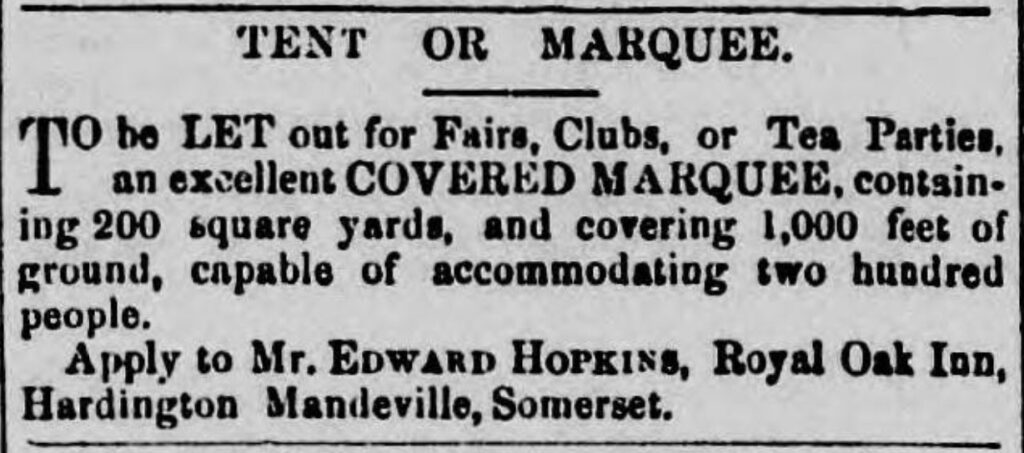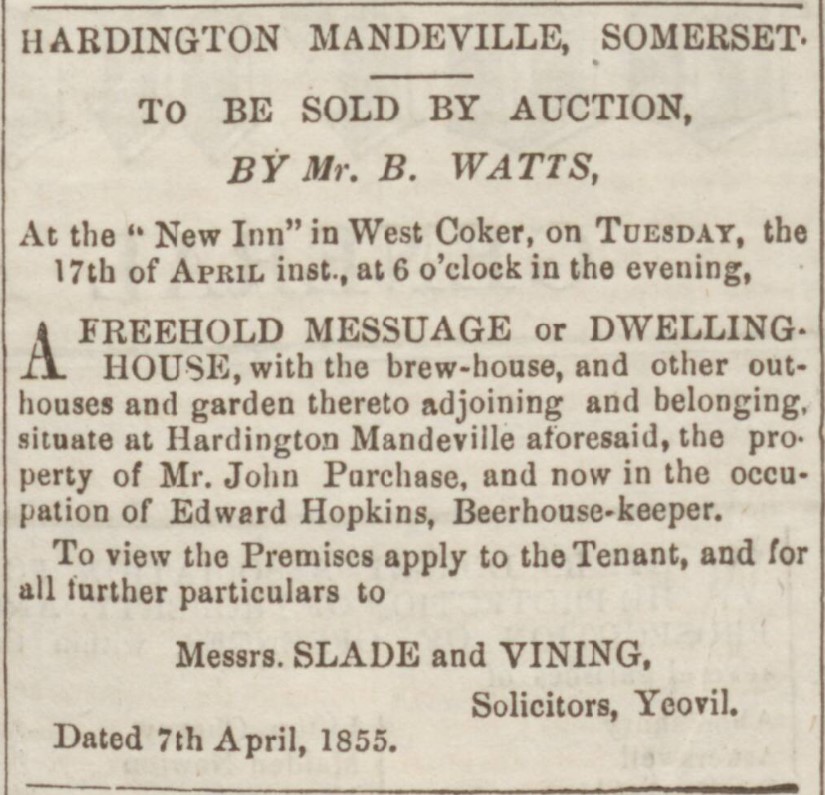Introduction
Edward Hopkins was a shoemaker at Hardington Moor from about 1848 to 1855, during which time he also ran a beerhouse. After leaving Hardington, he ran the Anchor Inn at Stoke Abbott before moving to Corscombe.
Life at Cheddington
Edward was born at Cheddington around 1811, the first of eight children born to William and Mary Hopkins. His father was a farm labourer.
By 1838, Edward was working as a shoemaker.
On 19 April 1838, Edward married his first cousin, Maria Burridge at Cheddington. He was 26 and she was 24. He signed his name, while she made her mark.
Life at South Perrott
Edward and Maria settled at South Perrott, where he continued to work as a shoemaker.
In 1845 and 1847, he won a cash prize of 6s for the high standard of his allotment.[1]
While living at South Perrott, they lost two of their children. William died in about 1840 at the age of two, and another child named William died in 1848 at the age of two. This left them with one surviving child, Emily.
Life at Hardington
Around 1848, Edward and his family moved to Hardington to make a fresh start. They occupied a house owned by John Purchase, who had left the village in about 1846.[2] Edward continued working as a shoemaker, an occupation he listed when registering the births and baptisms of his three children born at Hardington.[3]
In addition to making and mending shoes, Edward ran a beerhouse, which was recorded in the 1851 census as the Fountain’s Inn.[4] It was probably located at plot 114 of the tithe map, close to what later became known as Vassall’s corner. This location is consistent with the 1851 census.
The name of the inn appears to have changed during Edward’s time there. When, in July 1854, he advertised a marquee to rent to accommodate 200 people, he put his address as the Royal Oak Inn, Hardington.[5]
On 17 April 1855, John Purchase’s house, brewhouse, outbuildings and garden were sold by auction at the New Inn, West Coker. The advert stated that the premises were in the occupation of Edward Hopkins, beerhouse keeper. [6]
Life at Stoke Abbott
At that point, Edward and his family left Hardington. By August 1858, they had moved to Stoke Abbott, where Edward kept the Anchor Inn and ran a grocery business.[7] In May 1865 and May 1867, he provided dinner for the members of the village friendly society.[8]
In November 1871, Edward transferred the licence of the Anchor Inn to Samuel Robert Perry.[9]
Life at Corscombe
Edward and his wife moved to Corscombe, where they ran a shop selling groceries and drapery. Edward died on 4 December 1874, leaving property valued at about £200, which he left entirely to his wife.[10]
Maria’s later life
After Edward’s death, Maria continued running the shop.[11] Their daughter, Emily, ran a millinery and dressmaking business alongside the shop until 1877, when she married Enos Cox of Hardington.[12]
Maria may have briefly moved to Hardington to live with Emily before deciding to join her youngest daughter, Marina, at Melcombe Regis. On 20 February 1878, a sale of her furniture and stock-in-trade was held at Hardington.[13]
Maria joined Marina in her lodgings at 27 Wesley Street, Melcombe Regis. Shortly after, she made her will on 16 March 1878, appointing Marina’s employer, Harry Wheeler of the Weymouth and County Library, as her executor.[14] A few days later, she fell ill with bronchitis, which resulted in her death on 24 March 1878.[15] She left effects valued at “under £100”, which she bequeathed entirely to Marina.[16]
Children
Edward and Maria had six children:
Circa 1838-Willam (died at the age of two);
1839- Emily Ann (ran a millinery and dressmaking business at Stoke Abbott and later Corscombe; married Enos Cox of Hardington at Corscombe in 1877; died in 1909);
1845- William (died in 1848 at the age of two);
1849- Mary Ann (married James Collard in about 1871; resided in London, Kent and Hertfordshire; died after 1911)
1852- Marina (resided at Melcombe Regis and Weymouth; never married; died in 1930);
1854- Parmenas (worked as a grocer’s assistant at Manuden, Essex, and as a driver at Canterbury; certified insane in 1895 and sent to the Somerset asylum, Bishops Lydeard, where he died in 1904).[17]
References
[1] Sherborne Mercury, 25 October 1845, p.4; 16 October 1847, p.4.
[2] Voters’ Lists.
[3] Birth certificate of Mary Ann Hopkins; birth certificate of Parmenas Hopkins. The birth certificate of Maria Hopkins has not been obtained, but probably also recorded her father’s occupation as a shoemaker.
[4] In legal terms, an inn was distinct from a beerhouse: inns offered lodging and held a full magistrate’s licence, whereas beerhouses, created under the 1830 Beerhouse Act, sold only beer (and later cider) under an excise licence. In everyday parlance, however, the distinction was often blurred, and a beerhouse might be called an “inn” without any change in its legal status.
[5] Sherborne Mercury, 4 July 1854, p.2. This is the only known instance linking Edward to that name, and it may represent either a short-lived re-naming of the beerhouse or a compositor’s error. The tent itself was a considerable investment, probably intended for club dinners and other gatherings, and may have been bought by Edward himself or provided by his landlord.
[6] Sherborne Mercury, 10 April 1855, p.2; 17 April 1855, p.2.
[7] Stoke Abbott Jury List.
[8] Bridport News, 20 May 1865, p.6; 1 June 1867, p.3.
[9] Southern Times and Dorset County Herald, 25 November 1871, p.4.
[10] The will of Edward Hopkins, dated 9 July 1874, proved at Blandford on 13 March 1875.
[11] Trade directory of 1875.
[12] Western Gazette, 20 February 1874, p.4; 27 February 1874, p.7; 10 April 1874, p.4; 12 March 1875, p.4; 19 March 1875, p.4.
[13] Pulman’s Weekly News and Advertiser, 19 February 1878, p.2.
[14] The will of Maria Hopkins, dated 16 March 1878, proved at the Principal Registry on 27 July 1878.
[15] Death certificate of Maria Hopkins.
[16] The will of Maria Hopkins, dated 16 March 1878, proved at the Principal Registry on 27 July 1878.
[17] Criminal Lunacy Warrant and Entry Books, 1882-1898.





